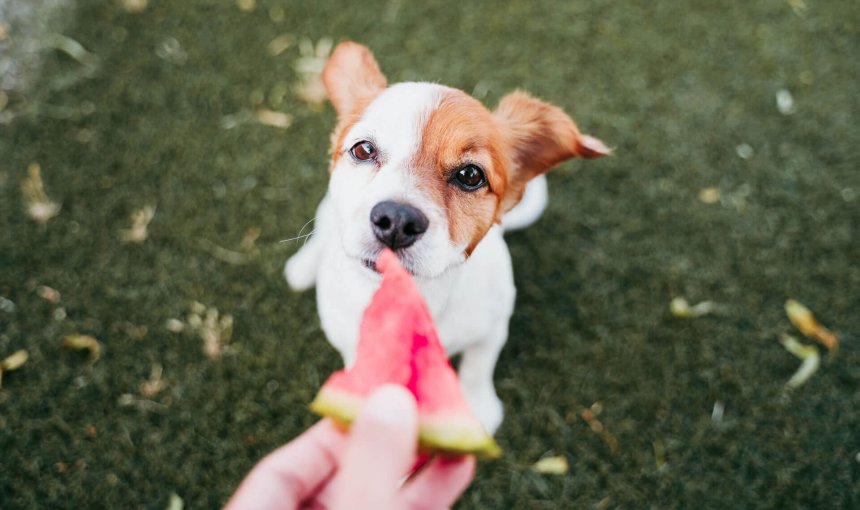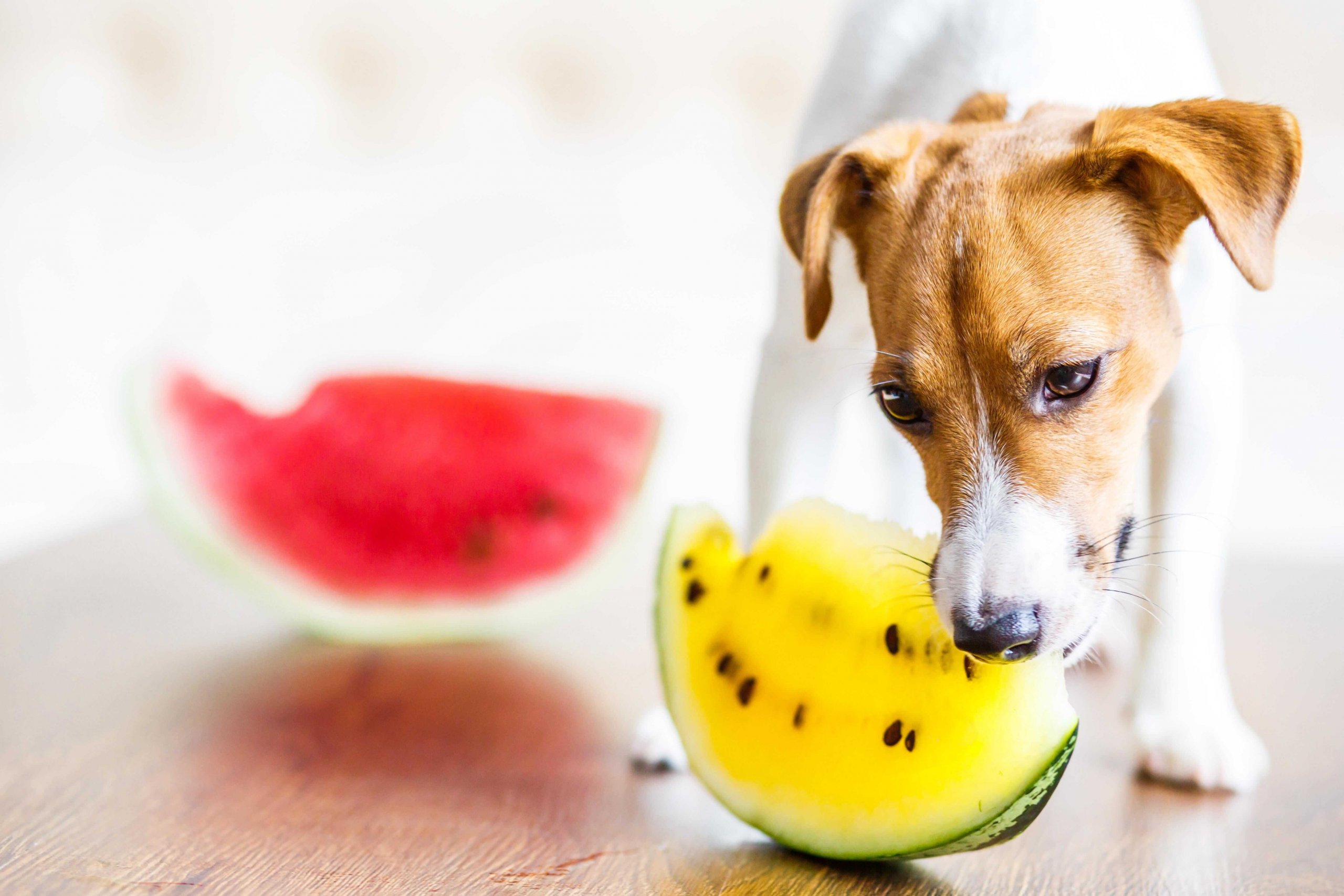Can Dogs Eat Watermelon?
Watermelon is a healthy, nutritious treat for your dog to enjoy. But some parts of a watermelon are off-limits for your pup. Read on to find out what’s safe and what’s not.

Everyone enjoys a sweet refreshing treat on a hot summer day – even your dog! And your dog will appreciate you for feeding them these cooling foods for dogs in summer. Watermelon is one such food, and has vitamins, minerals, and a high water content that helps to hydrate your dog. But be careful about which parts you offer to your pooch. In this post, we’ll answer the question, Can dogs eat watermelon? plus everything else you need to know about dogs and watermelon to help you enjoy safe summertime snacking with your canine friend.

Always know your buddy is healthy & safe
Read more- Is watermelon safe for dogs?
- Why do dogs love watermelon?
- How is watermelon good for dogs?
- Are all parts of watermelon safe to eat for dogs?
- How to feed watermelon to dogs
- Top dog treats/food with watermelon
- More frequently asked questions
- Can dogs eat all types of melon?
- Is seedless watermelon a better choice for dogs?
- Can I give my dog watermelon every day?
- How much watermelon should I feed my dog?
- Can diabetic dogs eat watermelon?
- Can dogs eat watermelon seeds?
- Can dogs eat watermelon rind?
- Can puppies eat watermelon?
- What if my dog ate watermelon and fell ill?
- What other fruits can dogs eat?
Is watermelon safe for dogs?
Yes, watermelon is a safe and healthy treat for your dog to eat, but only if you feed it to your dog correctly. The pink flesh is fine for your dog to consume. But there are two parts of the watermelon that you should NOT give to your dog: the seeds and the rind.
Watermelon is safe, but it’s always a good idea to check with your veterinarian before giving human food to your pet, just to be on the safe side. If your dog is on medications, make sure that these meds do not interact with specific foods.
Why do dogs love watermelon?
Watermelon has a water content of 92%, so it is refreshing to eat in warm weather because it helps to replenish your dog’s body. Plus, watermelon is natural and slightly sweet, which makes it an extra yummy treat for your pup.
Find out: How Much Water Does Your Dog Need In A Day?
How is watermelon good for dogs?
Watermelon may be mostly water, but the pink flesh offers many nutritional benefits for your dog.
Watermelons contain high levels of potassium; Vitamins C and B6, which support the immune system; and Vitamin A, which supports healthy eyes, hair, and skin. Watermelon gets its pinkish red color from lycopene, an antioxidant compound that supports healthy vision and is thought to lower the risk of certain types of cancer.
This tasty natural snack also contains plenty of fiber for healthy digestion. Watermelon contains no sodium, cholesterol, or fat, plus it’s low in calories.
Offer only fresh natural watermelon to your dog. Do not serve canned, sweetened, or watermelon packed in syrup. These products contain too much added sugar for your dog. Some prepared watermelon products could contain xylitol, an artificial sweetener that is deadly for dogs.
Are all parts of watermelon safe to eat for dogs?
Not all parts of a watermelon are safe for dogs to eat. The green rind of the watermelon is tough and hard for dogs to chew, especially petite dogs with smaller teeth. This means your dog could end up gulping down a large chunk of watermelon rind without chewing it. This hard-to-digest rind could end up lodged in your dog’s digestive tract, causing a dangerous intestinal blockage.
Watermelon seeds are also off-limits for dogs, especially the large black seeds of a seeded watermelon. These hard seeds do not digest easily and they could end up packed together, blocking your dog’s digestive tract. Don’t worry if a large dog swallows one or two seeds – they’ll probably be OK. But definitely keep smaller dogs away from the black watermelon seeds.
How to feed watermelon to dogs
When preparing a watermelon treat for your pup, cut just one or two 1” cubes of the pink flesh from the melon or scoop them out with a melon baller. Carefully remove all seeds.
Offer your dog just one or two small pieces of watermelon, especially if this is your dog’s first time enjoying this refreshing treat. Even if your dog seems to enjoy the watermelon treat, resist the urge to offer more. Wait and see how your dog tolerates the watermelon over the rest of the day.
Dogs cannot digest fruits as well as humans can. Feeding too much of any fruit can cause stomach upset or diarrhea. Your dog’s stool may be softer than normal the next day, and that’s OK. But this is a sign that the watermelon has affected their digestion, and you don’t want their digestive issues to go beyond soft stool into actual diarrhea.

Get health alerts for your dog
Our pups can’t always tell us if something’s wrong. But if their tracker detects unusual changes in their routine, you’ll get an alert, helping you catch potential issues early.
Top dog treats/food with watermelon
Plain watermelon is a yummy natural snack all on its own, but you can take it a step further and create a special treat for your furry friend. Just remember to check with your veterinarian before offering human food to your pooch. See if your pet insurance covers nutrition consultations like this.
Dogs love frozen watermelon chunks, which are extra-refreshing on a steamy summer afternoon. Just cut up some pink watermelon flesh (no seeds or rind) and toss it in the freezer for a few hours. You may want to lay the pieces a few inches apart on a tray so they don’t freeze into one big lump.
Before you offer frozen watermelon, be sure your dog’s teeth are strong enough to crunch on an icy treat without becoming damaged.
Make watermelon “pupsicles” by pureeing together watermelon, plain yogurt, and a tiny bit of honey. Pour the mixture into mini ice cube trays, then freeze. You can even buy molds in the shape of a dog bone or paw print for super adorable treats. Look for recipes online.
Mix up a watermelon smoothie with watermelon, blueberries, and other fruits that are safe for dogs to eat, such as blackberries, strawberries, kiwi, oranges, or bananas. Let your doggy lap up a spoonful after an outdoor play session.
When offering any type of watermelon treat to your dog, moderation is key. One or two bites (or slurps, in the case of a smoothie) are enough. High-quality dog food should still be your pup’s primary diet.
More frequently asked questions
Can dogs eat all types of melon?
Melons like honeydew and cantaloupe, along with watermelon, are good natural choices for your dog. Cantaloupe has anti-inflammatory properties, which could help dogs who have arthritic joints. Again, always check with your vet before offering human foods to your dog.
Is seedless watermelon a better choice for dogs?
Seedless watermelons are much easier for dogs and people to eat because they usually do not contain the mature black seeds contained in seeded watermelons (there might be a few black seeds in there, so look carefully).
Invented about 50 years ago, seedless watermelons are sterile hybrids that are the result of cross-pollination (this is not the same as genetic modification). The little white “seeds” are actually the seed coats of seeds that did not mature. These undeveloped seeds are OK for your dog to eat, but to be on the safe side, try to select parts of the watermelon without these little white seeds for your dog to consume.
Can I give my dog watermelon every day?
Like all treats, watermelon should only be given to your dog occasionally, depending on how well their digestive system tolerates it. As a rule, calories from treats should not exceed 10% of your dog’s daily calorie intake.

How much watermelon should I feed my dog?
Your dog has a steady diet of the same food every day – and they are fine with that. By eating the same food every day, their digestive system operates on a pretty regular schedule. Feeding one or two bites of watermelon, without rind or seeds, is probably enough for your pup.
Can diabetic dogs eat watermelon?
Watermelon and other fruits naturally contain sugar, so if your dog is diabetic, you are probably limiting sugars and starches in their diet to maintain their health. Talk to your veterinarian or a pet nutritionist about feeding watermelon or adding other human foods to your diabetic dog’s diet.
Can dogs eat watermelon seeds?
The hard black seeds contained in seeded watermelons should not be given to your dog because they are hard to digest and can cause intestinal blockage. Even seedless watermelons have tiny white seeds that you should remove if you can. To make it easy, simply choose parts of the melon that have no seeds at all, and give a few small chunks of the sweet juicy flesh to your pooch.
Can dogs eat watermelon rind?
Watermelon rind should not be fed to dogs. Watermelon rind is hard to chew and difficult to digest, and it can cause intestinal problems, such as vomiting or diarrhea.
Can puppies eat watermelon?
Puppies need highly nutritional food to power their growth, and watermelon does contain several important nutrients and fiber. But as with all dogs, serve watermelon sparingly – just a one-inch cube is a good starting point. See how your puppy tolerates it before giving more than that.
What if my dog ate watermelon and fell ill?
If your dog wolfed down the entire bowl of watermelon at your backyard picnic, be on the lookout for digestive symptoms. More than likely, your dog will have soft stool or diarrhea the next day.
If your dog ingested a lot of black watermelon seeds or rind, watch for signs of intestinal blockage, which can include vomiting, diarrhea, bloating, inability to pass stool, abdominal pain, or loss of appetite. Intestinal blockage can be life-threatening, so call your veterinarian if you notice your dog is experiencing these symptoms. Check to see if your pet insurance covers this type of emergency visit.
What other fruits can dogs eat?
Treats such as natural fruit can have health benefits for your dog, because these foods contain nutrients, water, and fiber. Less than 10% of your dog’s calories should some from treats.
Dogs safely can eat a number of fruits, including seedless watermelon, cantaloupe, honeydew melon, blueberries, blackberries, strawberries, raspberries, bananas, pear, pumpkin, apples, oranges, kiwis, and cranberries. Always offer these treats in small quantities to avoid stomach upset.
Dogs love refreshing treats, and fruity snacks such as natural watermelon are tasty and healthy for humans and dogs alike. Stock up on your favorites and be ready to enjoy these nutritional treats with your pup on a hot summer afternoon.




